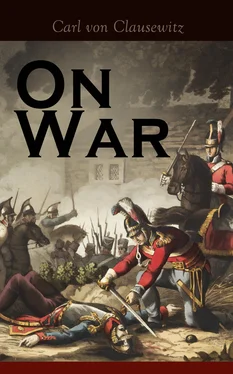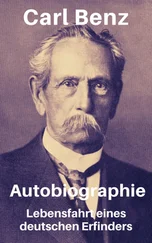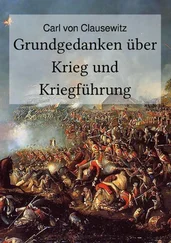It is still more ridiculous if, in addition to this, we reflect that the same critic, in accordance with prevalent opinion, excludes all moral forces from theory, and will not allow it to be concerned with anything but the material forces, so that all must be confined to a few mathematical relations of equilibrium and preponderance, of time and space, and a few lines and angles. If it were nothing more than this, then out of such a miserable business there would not be a scientific problem for even a schoolboy.
But let us admit: there is no question here about scientific formulas and problems; the relations of material things are all very simple; the right comprehension of the moral forces which come into play is more difficult. Still, even in respect to them, it is only in the highest branches of Strategy that moral complications and a great diversity of quantities and relations are to be looked for, only at that point where Strategy borders on political science, or rather where the two become one, and there, as we have before observed, they have more influence on the “how much” and “how little” is to be done than on the form of execution. Where the latter is the principal question, as in the single acts both great and small in War, the moral quantities are already reduced to a very small number.
Thus, then, in Strategy everything is very simple, but not on that account very easy. Once it is determined from the relations of the State what should and may be done by War, then the way to it is easy to find; but to follow that way straightforward, to carry out the plan without being obliged to deviate from it a thousand times by a thousand varying influences, requires, besides great strength of character, great clearness and steadiness of mind, and out of a thousand men who are remarkable, some for mind, others for penetration, others again for boldness or strength of will, perhaps not one will combine in himself all those qualities which are required to raise a man above mediocrity in the career of a general.
It may sound strange, but for all who know War in this respect it is a fact beyond doubt, that much more strength of will is required to make an important decision in Strategy than in tactics. In the latter we are hurried on with the moment; a Commander feels himself borne along in a strong current, against which he durst not contend without the most destructive consequences, he suppresses the rising fears, and boldly ventures further. In Strategy, where all goes on at a slower rate, there is more room allowed for our own apprehensions and those of others, for objections and remonstrances, consequently also for unseasonable regrets; and as we do not see things in Strategy as we do at least half of them in tactics, with the living eye, but everything must be conjectured and assumed, the convictions produced are less powerful. The consequence is that most Generals, when they should act, remain stuck fast in bewildering doubts.
Now let us cast a glance at history—upon Frederick the Great’s campaign of 1760, celebrated for its fine marches and manœuvres: a perfect masterpiece of Strategic skill as critics tell us. Is there really anything to drive us out of our wits with admiration in the King’s first trying to turn Daun’s right flank, then his left, then again his right, &c.? Are we to see profound wisdom in this? No, that we cannot, if we are to decide naturally and without affectation. What we rather admire above all is the sagacity of the King in this respect, that while pursuing a great object with very limited means, he undertook nothing beyond his powers, and just enough to gain his object. This sagacity of the General is visible not only in this campaign, but throughout all the three Wars of the Great King!
To bring Silesia into the safe harbour of a well-guaranteed peace was his object.
At the head of a small State, which was like other States in most things, and only ahead of them in some branches of administration; he could not be an Alexander, and, as Charles XII, he would only, like him, have broken his head. We find, therefore, in the whole of his conduct of War, a controlled power, always well balanced, and never wanting in energy, which in the most critical moments rises to astonishing deeds, and the next moment oscillates quietly on again in subordination to the play of the most subtle political influences. Neither vanity, thirst for glory, nor vengeance could make him deviate from his course, and this course alone it is which brought him to a fortunate termination of the contest.
These few words do but scant justice to this phase of the genius of the great General; the eyes must be fixed carefully on the extraordinary issue of the struggle, and the causes which brought about that issue must be traced out, in order thoroughly to understand that nothing but the King’s penetrating eye brought him safely out of all his dangers.
This is one feature in this great Commander which we admire in the campaign of 1760—and in all others, but in this especially—because in none did he keep the balance even against such a superior hostile force, with such a small sacrifice.
Another feature relates to the difficulty of execution. Marches to turn a flank, right or left, are easily combined; the idea of keeping a small force always well concentrated to be able to meet the enemy on equal terms at any point, to multiply a force by rapid movement, is as easily conceived as expressed; the mere contrivance in these points, therefore, cannot excite our admiration, and with respect to such simple things, there is nothing further than to admit that they are simple.
But let a General try to do these things like Frederick the Great. Long afterwards authors, who were eyewitnesses, have spoken of the danger, indeed of the imprudence, of the King’s camps, and doubtless, at the time he pitched them, the danger appeared three times as great as afterwards.
It was the same with his marches, under the eyes, nay, often under the cannon of the enemy’s Army; these camps were taken up, these marches made, not from want of prudence, but because in Daun’s system, in his mode of drawing up his Army, in the responsibility which pressed upon him, and in his character, Frederick found that security which justified his camps and marches. But it required the King’s boldness, determination, and strength of will to see things in this light, and not to be led astray and intimidated by the danger of which thirty years after people still wrote and spoke. Few Generals in this situation would have believed these simple strategic means to be practicable.
Again, another difficulty in execution lay in this, that the King’s Army in this campaign was constantly in motion. Twice it marched by wretched cross-roads, from the Elbe into Silesia, in rear of Daun and pursued by Lascy (beginning of July, beginning of August). It required to be always ready for battle, and its marches had to be organised with a degree of skill which necessarily called forth a proportionate amount of exertion. Although attended and delayed by thousands of waggons, still its subsistence was extremely difficult. In Silesia, for eight days before the battle of Leignitz, it had constantly to march, defiling alternately right and left in front of the enemy:—this costs great fatigue, and entails great privations.
Is it to be supposed that all this could have been done without producing great friction in the machine? Can the mind of a Commander elaborate such movements with the same ease as the hand of a land surveyor uses the astrolabe? Does not the sight of the sufferings of their hungry, thirsty comrades pierce the hearts of the Commander and his Generals a thousand times? Must not the murmurs and doubts which these cause reach his ear? Has an ordinary man the courage to demand such sacrifices, and would not such efforts most certainly demoralise the Army, break up the bands of discipline, and, in short, undermine its military virtue, if firm reliance on the greatness and infallibility of the Commander did not compensate for all? Here, therefore, it is that we should pay respect; it is these miracles of execution which we should admire. But it is impossible to realise all this in its full force without a foretaste of it by experience. He who only knows War from books or the drill-ground cannot realise the whole effect of this counterpoise in action; we beg him, therefore, to accept from us on faith and trust all that he is unable to supply from any personal experiences of his own.
Читать дальше












